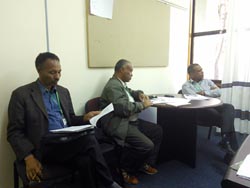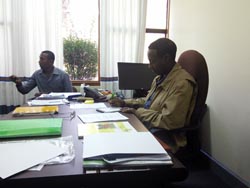Moving on from a "proof of concept" during the first phase of the N2Africa approach at scale, the second phase was designed to scale out the proven legume technologies using a "business led" approach. The legume intensification technologies vary from country to country, among crops and regions within countries but include a strong focus on getting the best legume varieties and management approaches in place being inoculants, fertilizer with P, K and other nutrients, and ancillary interventions. Further N2Africa now has a strong emphasis on gender-sensitive approaches for pre- and post-harvest labour saving tools, value addition at household to Small Medium Enterprise (SME) levels plus sustainable supply of the promoted inputs. The approach of going to scale is through partnerships with the public and private sectors whom would be engaged in Capacity Building, Dissemination, Input supply, Marketing, Learning and Project M&E.
The approach could not have come at a better time as the Nigeria country director Professor Sani Miko of SG2000 mentioned ‘meaningful partnerships are the new way to go’ and welcomed N2Africa to add value to their AGRA funded ‘Improving Productivity and Incomes of Smallholder Farming Households Through Innovative Extension and Advisory Services in Northern Nigeria’ Project.
Development organizations no longer wish to operate in isolation, most donors insist on value chain approaches making N2Africa compatible with both the NGO and private sectors. Thus N2Africa is moving to partnership agreements that clearly define each partner’s roles, contributions and we have joint M&E. The approach was initially branded as somewhat opportunistic, a financially modest contribution but full attribution.
After one year, 59 partnerships were sealed along the legume value chains including those on agronomic research and rhizobiology. It is expected the target of 550,000 households in 11 countries will be covered by 2015 over one to multiple year partnership agreements, hence setting the landscape for actual implementation.
Special credit on spear-heading comprehensive partnerships is given to Ethiopia. A good example is the multi-partners, comprehensive ‘Balegreen Spice and Grain Development Plc’ partnership which is further elaborated on in Box 1.
|
Box 1. An N2Africa Inclusive Partnership Case Example in Ethiopia
Balegreen Spice and Grain Development Plc is a a nucleus farm involved in both their own and community seed multiplication, in dissemination, bulking, mechanization services, fertilizer and inoculant supply to out-growers linked to and organized through various Farmers Producers Cooperative Unions covering 90,000 smallholder farmer households. The partnership is further strengthened through an N2Africa solicited USAID funded Alliance for Green Revolution in Africa’s (AGRA) Scaling Seeds and Technologies Partnership (SSTP) project grant of $300,000 to the lead grantee Menagesha Biotech Industry Plc. (MBI), a private sector inoculant manufacturer. The project is entitled “Scaling Chickpea Technologies for Increased Production and Productivity of Smallholder Farmers in Major Chickpea Producing Areas of Ethiopia”. It is designed to establish feasible input supply chains and grain market access involving a consortium of Public-Private partners and is part of the larger partnership with Balegreen Spice and Grain Development Plc.
With the grant support from SSTP to the lead grantee Menagesha Biotech Industry Plc. (MBI) and the overall project management by the Steering Committee composed of the key project partners involving N2Africa, MBI, AGRA Ethiopia, Balegreen and Tsehay Union under the chairmanship of -N2Africa, the project will be implemented for 26 months (from February 2015 to April 2017) in the major chickpea growing Woredas of Amhara, Oromiya and SNNPR regions. The partnership is structured under four strategic objectives of supporting chickpea and other legumes input production and distribution, capacity building, partnership development and grain market access. Two seed multiplying partners, Balegreen and Tsehay Union will produce and supply 2,700 tons of certified chickpea seed to the smallholder farmers and the inoculant plant, MBI, will produce and supply over 11 tons of inoculants and provide technical backstopping. By the end of project period the dissemination and commercialization efforts will ensure sustainability of the supply chains. The input distribution channels will use the existing Farmers’ Cooperative Unions to initiate local input dealers. Furthermore, technologies for chickpea and other legumes will be demonstrated to smallholder farmers who will be trained on improved production practices, farming as a business, and linked to high potential and competitive grain buyers mentioned below. This will be achieved through a collaboration among public research and extension organizations (i.e. the National Soil Testing Centre - NSTC and Holeta Agricultural Research Centre-COMPRO II, the Agricultural Transformation Agency- ATA, the National Agricultural Research System entities and the Office of Agriculture for dissemination) and the development partners SNV and Agriterra through their Cooperatives for Change (C4C) project.
The ‘modest’ but crucial role of N2Africa is defined as technical backstopping, soliciting the AGRA grant, coordination of the consortium, facilitation of market linkages, M&E and to provide evidence of the effect of using improved seeds, inoculants and legume (blended) fertilizers. The main project outcomes are increased production, distribution and use of quality Kabuli chickpea and other legumes’ seeds along with inoculants, NPS fertilizer and improved agronomic practices, better coordination, enhanced technical capacity and awareness of farm communities and hence better use and adoption of technologies to enhance production of chickpea and other legumes. Tamiru Amanu, N2Africa Business Development Officer in Ethiopia |
Challenges facing some N2Africa partnerships are with sustainable input supply of certified legume seeds, inoculants and legume fertilizers that have not yet seen well established private sector led supply chains. Early on in the project it was realized that these relatively ‘difficult’ inputs with limited shelf life (legume seeds, inoculants), awareness, and for seeds easy for farmers to self multiply for some years which inhibits the private sector to take them up in their portfolio facing large opportunity costs or low profitability.
The above portrays a "chicken and egg" situation of on the one hand farmers mentioning the lack of these inputs slowing technology adoption and on the other the input suppliers claiming lack of demand. As the demand exists but is unpredictable and scattered, the project is looking at innovative ICT solutions to predict and dynamically track demand information through a commercial new chain actor – work still in progress. In the meantime two types of partnerships have developed for which comparison is of great interest to shine more light on farmer adoption and adaptation processes.
These two partnerships can be distinguished as so-called ‘closed systems’ and ‘open systems’. For the former the Bale Green – ACOS is an example of a nucleus farm and buyer that are engaged in providing farmers inputs, services and a guaranteed output market. Other examples are AgDevCo and Busaka in Ghana and Export Trading Group in Tanzania. Most other partnerships are ‘open’ where farmers input and output chain actors are not interconnected, hence through partner value chain projects the linkages, information exchange and in general improved value chain performance is promoted.
Basically dissemination efforts in closed systems are expected to render higher adoption rates than in open systems where input suppliers and farmers still have to tune supply and demand and-or farmers face market risks and lack of services including input credit. On the other hand an array of other constraints, attitude, risks or otherwise bottlenecks may still be prevalent in farmer (segments) inhibiting adoption despite being part of a ‘closed system’. N2Africa is therefore looking at analyzing the two systems through its MSc-Internship program, hereby calling on the interested candidates to execute this. N2Africa is moving quickly with its partners and we look forward to learning what the key components of success will be. If you have comments and suggestions please feel free to contact me.
Edward Baars, N2Africa Senior Business Development Officer



